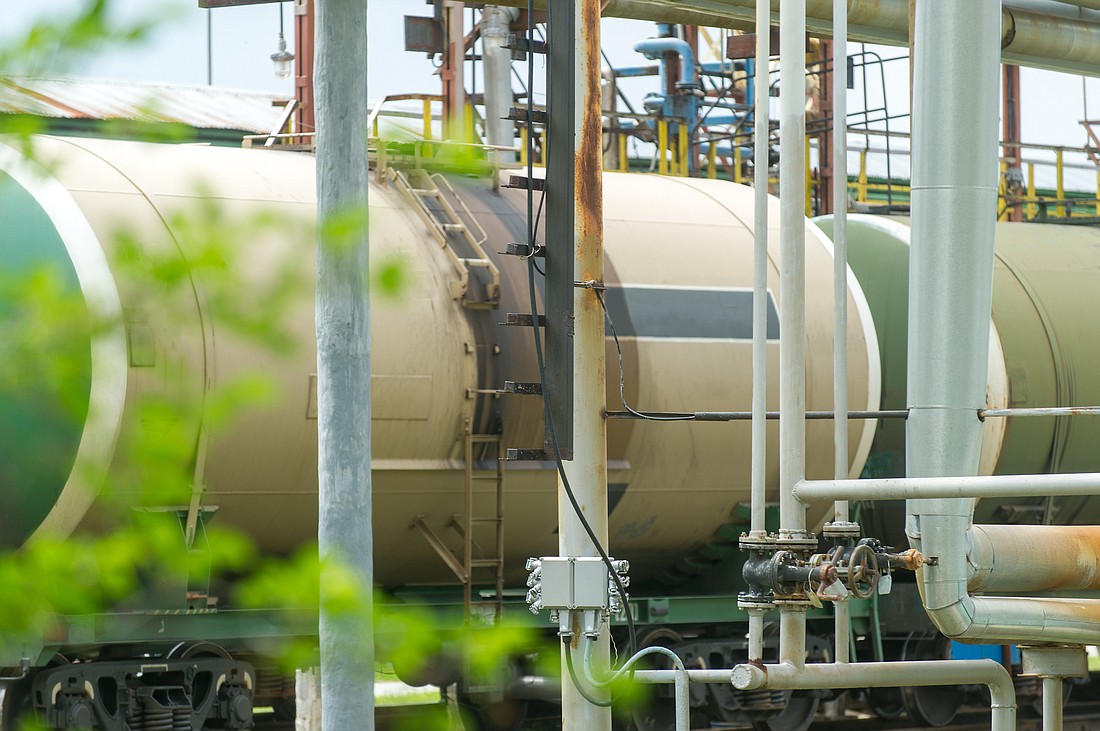- April 4, 2025
-
-
Loading

Belvedere Terminals, a St. Petersburg firm, plans to spend $750 million on an ambitious Florida railcar system to improve gasoline and diesel delivery in Florida.
Florida has not a single refinery, so gasoline and diesel are usually transported from three main ports (Tampa, Jacksonville and Port Everglades) via trucks. That results in higher distribution costs, according to the Florida attorney general's website.
Over water and then by trucks is basically the only way gasoline and diesel get distributed in the Sunshine State, says Belvedere Terminals CFO Timothy Schwarz — and that method is vulnerable to hurricanes and flooding.
"It is not the most efficient way," says Schwarz. "It works. But it has its issues, and it's particularly subject to disruption anytime there's a port closure."
Schwarz says Port Everglades, outside Fort Lauderdale, recently closed for two weeks because of rain and flooding.
Further, no fuel pipelines cross the Florida state line, although some companies have tried to establish such a network. Those entities dropped the effort, says Schwarz.
But now Belvedere Terminals plans to import gasoline, diesel and jet fuel from its Mississippi hub, using pipelines to connect to Georgia rail lines north of Jacksonville. From there, Belvedere will then train the fuel to Florida, and distribute fuel to trucks from three "spurs" in Jacksonville, Ormond Beach and Fort Pierce.
Schwarz says he estimates the railcars will move 50 million barrels of gasoline, diesel and jet fuel a year. By comparison, the state of Florida uses 345 million barrels of such refined petroleum products a year, according to the Energy Information Administration.
Belvedere Terminals has been at work for years on the proposal, which will add 200 jobs to the state, says Schwarz. It closed a deal on funding in January 2022 with a major but unnamed investor, and work will begin soon on the initial rail route that will have a main location in Collins, Mississippi (which will cost another $500 million to develop).
One thing that helped the deal was estimated use of fuels in Florida. Schwarz says demand will essentially be "flat," or stable, until 2050, which is encouraging given federal officials are so heavily advocating the use of electric cars.
Seven more terminals are planned for Florida after the completion of the first phase. Schwarz did not say where those cities or regions will be, but they will likely not be too close to Tampa, since the port provides fuel to trucks, making a spur location less competitive there.
But it's possible a spur could be somewhat close to the Tampa Bay area — the company will build a spur near Jacksonville because of the size of the west Jacksonville market, Schwarz says.
The St. Petersburg connection comes because Belvedere Terminals CEO Edwin Cothron lived in the region, and liked the location for the headquarters and the office workforce.
The company then looked at markets that could be better served, Schwarz says. They settled first on the east coast of Florida, and pinpointed the general regions of western Duval County, Volusia County and St. Lucie County. Those plans are underway, and include such things as a 16-storage tank fuel farm near the Ormond Beach city limits.
That fuel farm would take in about seven trucks an hour, or more than 160 a day, according to the Ormond Beach Observer. The Volusia County proposal brought heavy local opposition, and that opposition remains — but Schwarz says some state and county leaders have generally embraced the plan, especially given Belvedere asked for no special tax considerations.
State officials are eager to make the distribution of gasoline less dependent upon ports, Schwarz says. And the stability and cost-efficiency of the fuel distribution also seems to have impressed Florida officials. While Belvedere certainly cannot control global oil markets or retail prices, the increased efficiency of the rail line could reduce local fuel costs by 10 to 15%, Schwarz says.
But as Belvedere was developing its plans, a railway disaster struck in East Palestine, Ohio. In early February 2023, a Norfolk Southern freight train with 151 railcars had a derailment, with 51 cars tipping. Of the hazardous material spilled, the plurality of it was vinyl chloride. The derailment and the resulting fire and toxic clouds struck a national nerve about rail safety — especially as an overheated railcar was spotted before the derailment.
Schwarz says safety will come first, with the railcars being specially designed with the most modern telemetric equipment being added. Railcars will also be inspected after every trip, Schwarz says. The railcars are being specifically designed for Belvedere, Schwarz says, with telecommunications feeding the headquarters with instant data.
"It is in constant feedback as to how each car is performing," says Schwarz. "We have exceeded every metric you can talk about regarding standards. We basically have passenger-level safety inspections on all of our trains, which is unusual. Every car will have telemetrics on it."
That means if something on the railcar overheats, the train's computer equipment will notify the driver and the managers. The company will stop the train, Schwarz says, and the railcar will taken off the railway.
A Volusia County spokesperson says no elected officials or staff have expressed endorsement of Belvedere's plan.
This story was updated to reflect that opposition to the company's project in Ormond Beach has been ongoing and widespread.